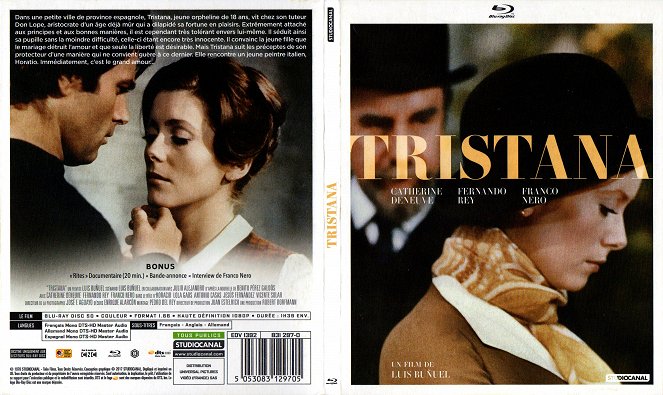Reżyseria:
Luis BuñuelScenariusz:
Julio AlejandroZdjęcia:
José F. AguayoObsada:
Catherine Deneuve, Fernando Rey, Franco Nero, José Calvo, José María Caffarel, Fernando Cebrián, Aldo Sambrell, Antonio Casas, Cándida Losada, Luis Rico (więcej)Opisy(1)
Fernando Rey gra arystokratę, który za dystyngowaną powierzchownością skrywa mieszczańską dekadencję. Opieka nad osieroconą chrześniaczką, piękną Tristaną, szybko traci pozór ojcowskiej. Dziewczyna ucieka przez jego pożądaniem, ale po dwóch latach wraca. Jest ciężko chora i godzi się na ślub. Ich małżeńskie pożycie przemienia się w koszmar i kiedy Don Lope bliski jest śmierci, Tristana z zimną krwią pozwala mu umrzeć (FilmBox)
(więcej)Recenzje (4)
This film is worth seeing mainly because of the excellent performance of Catherine Deneuve as Tristana. The transformation from an innocent, quiet girl to a life-loving young lady demanding love, and then into a bitter and even vengeful woman is truly breathtaking. Fernando Rey, however, excellently supported her, portraying the aging hypocritical lecher Don Lope more than convincingly. The successful indictment of the fallen morality of the Spanish middle class in the 1920s with a strong religious undertone is signed by none other than the eternal critic and surrealist, Luis Buñuel.
()
A powerful film, surprisingly not too demanding for the audience, but still difficult to penetrate because you will constantly have a feeling that something is not right and that it all must somehow twist, that there is no hope for a completely happy ending. The cast is superb, which is confirmed by Luis Buñuel's skillful direction. However, it did not manage to captivate me.
()
To be honest, I prefer Belle de Jour over Tristana - it is more playful and at the same time much more sarcastic than the relatively depressing Tristana, whose central theme is bitterness and resulting hatred. However, both films feature the wonderful Catherine Deneuve and the film works primarily thanks to her presence and excellent performance. It is not just a film about the relationship between an older man and an immature girl, but also a reflection of the society of its time, the dependent position of women, and the clash of the modern world with old orders and value systems. When Don Lope confronts a young artist and challenges him to a duel, he receives a punch in the nose instead of acceptance. This is how the world changes, where there is no longer room for old patriarchal nobility. Luis Buñuel is a sharp critic of the hypocrisy of old bourgeois and aristocratic rules, and his disdain for the world of so-called "better" people is evident in many dialogues. Overall impression: 85%.
()
Compared to Belle de Jour, there’s too much Fernando Rey, to whom I am allergic, and typical Buñuel jokes and ideas, but this time they are put together in a completely unacceptable collage. Regardless of Deneuve's interesting transformation from naive little girl to arrogance itself. Franco Nero is also really weak.
()
Galeria (32)
Photo © StudioCanal


Reklama